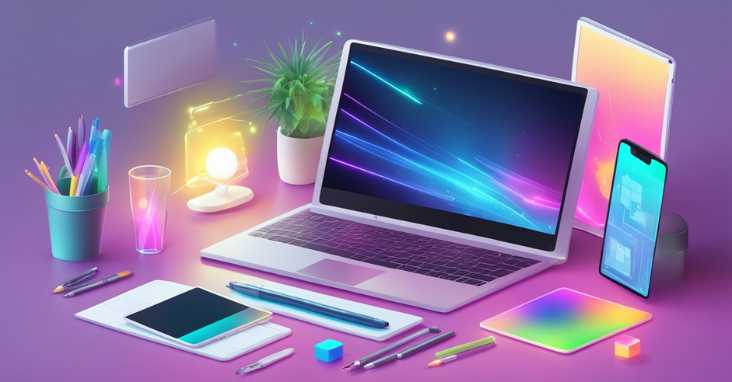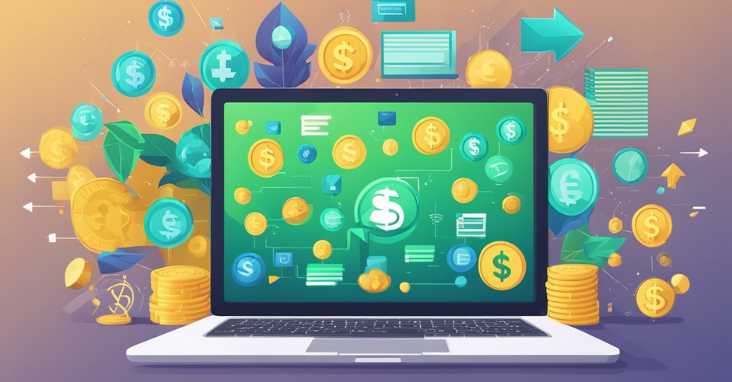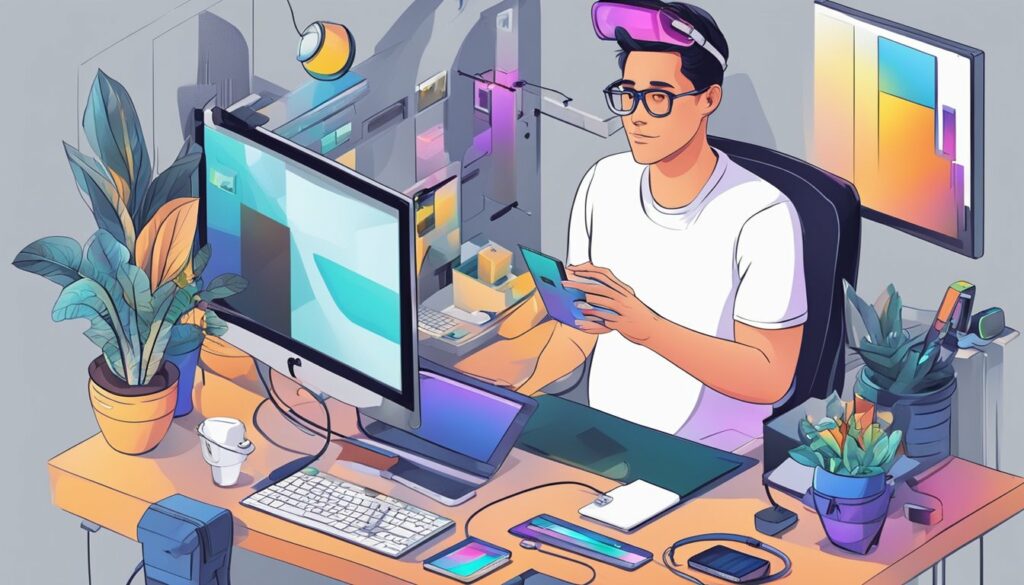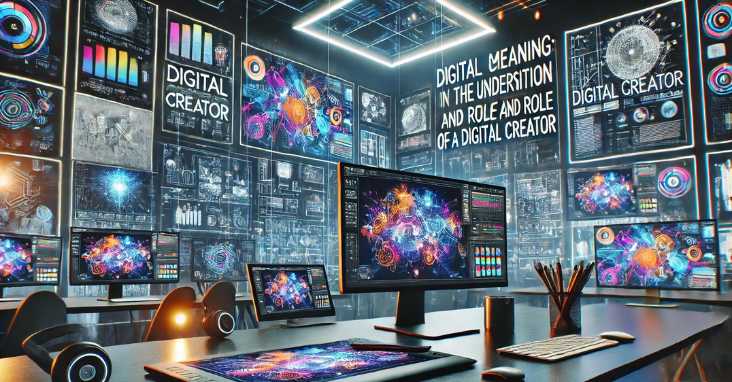What is a digital creator meaning ? A digital creator crafts content using digital tools for online platforms, blending creativity and technology.
Digital creators are a new breed of content creators who have emerged in the digital age. They use various digital platforms and tools to create content that is consumed by a large audience. A digital creator meaning encompasses a wide range of creators, including bloggers, YouTubers, podcasters, social media influencers, and more.

Defining the Digital Creator
A digital creator meaning is someone who uses digital platforms and tools to create content that is consumed by a large audience. They can create content in various formats, including text, video, audio, and images. The content they create can be educational, informative, entertaining, or a combination of all three. Digital creators can be found on various platforms, including social media, YouTube, blogs, and podcasts.
Platforms and Tools
Digital creators use various platforms and tools to create and distribute their content. They use social media platforms like Instagram, Twitter, and TikTok to reach a wider audience and engage with their followers. They also use video platforms like YouTube and Vimeo to create and share video content. In addition, they use tools like Canva, Adobe Creative Suite, and Final Cut Pro to create high-quality content that stands out from the crowd.
Key Takeaways
- Digital creators are content creators who use digital platforms and tools to create content for a large audience.
- They use various platforms and tools to create and distribute their content, including social media, video platforms, and creative software.
- The future of digital creation is bright, but it comes with its own set of challenges and considerations.
A Digital Creator Meaning

A digital creator is an individual who produces and distributes content online. They use various digital tools and platforms to create engaging content, build an audience, and establish a brand. The digital creator meaning is constantly evolving as new technologies and platforms emerge.
Roles and Responsibilities
Digital creators have a wide range of roles and responsibilities. Some of their primary responsibilities include:
Content Creation: Digital creators are responsible for creating high-quality content that resonates with their audience. They use a variety of tools and techniques to create engaging content, such as video editing software, graphic design tools, and social media platforms.
Brand Building: Digital creators are also responsible for building their brand. They use their content to establish a unique brand identity and voice that sets them apart from other creators in their niche.
Audience Engagement: Digital creators must engage with their audience to build a loyal following. They use social media, email marketing, and other channels to connect with their audience and build a community around their content.
Digital Creator vs. Content Creator
While digital creators and content creators share many similarities, there are some key differences between the two. Content creators focus primarily on creating content, while digital creators take a more holistic approach to building a brand and engaging with their audience.
Digital creators use a variety of digital tools and platforms to create and distribute their content, while content creators may focus on a single platform or medium. Additionally, digital creators are often more focused on building a brand and establishing a unique voice, while content creators may be more focused on creating content that is informative or entertaining.
In conclusion, a digital creator meaning is an individual who creates and distributes content online using a variety of digital tools and platforms. They have a wide range of roles and responsibilities, including content creation, brand building, and audience engagement. While there are similarities between digital creators and content creators, digital creators take a more holistic approach to building a brand and engaging with their audience. For more information on digital creators, check out this resource.
Platforms and Tools
Popular Platforms for Digital Creators
Digital creators have a wide range of platforms to choose from when looking to showcase their content and reach a larger audience. Some of the most popular platforms include Instagram, TikTok, YouTube, and personal websites.
Instagram is a great platform for visual content creators, with over 1 billion active users. It allows users to share photos, videos, and stories, making it a versatile platform for creators to showcase their work. With its built-in editing tools and filters, creators can easily enhance their content and make it more engaging.
TikTok has quickly become one of the most popular platforms for short-form video content. With its user-friendly interface and algorithm that promotes viral content, it has become a go-to platform for many digital creators. TikTok also offers a variety of editing tools and filters to help creators enhance their content.
YouTube remains one of the most popular platforms for video content creators. With over 2 billion monthly active users, it provides creators with a massive audience to showcase their work. Creators can monetize their content through ads and sponsorships, making it a viable platform for those looking to make a living from their content.
Personal websites are also a great option for digital creators looking to have more control over their content and brand. With a website, creators can showcase their work, sell products, and engage with their audience on their own terms.
Essential Tools for Content Creation
Digital creators require a variety of tools to produce high-quality content. Some of the essential tools include equipment such as cameras and microphones, video editing software, audio editing software, graphics software, and SEO and analytics tools.
When it comes to equipment, a good camera is essential for video and photo content creators. The Canon EOS R5 and Sony A7S III are both popular options for video content creators, while the Sony A7R IV and Nikon Z7 II are great for photo content creators. A good microphone is also important for creators looking to produce high-quality audio content.
Video editing software is another essential tool for content creators. Adobe Premiere Pro and Final Cut Pro are two of the most popular options, offering a wide range of editing tools and effects to help creators enhance their content.
For audio editing, software such as Audacity and Logic Pro X are popular options. These tools offer a variety of editing tools and effects to help creators produce high-quality audio content.
Graphics software such as Adobe Photoshop and Illustrator are also essential for digital creators looking to produce high-quality graphics and designs.
Finally, SEO and analytics tools such as Google Analytics and SEMrush are important for creators looking to optimize their content for search engines and track their performance.
Overall, digital creators have a wide range of platforms and tools to choose from when looking to produce high-quality content. By utilizing these tools effectively, creators can reach a larger audience and build a successful career in the digital space.
Content Strategy and Creation
Creating content is a key aspect of being a digital creator. It involves developing a strategy that is tailored to the creator’s niche and target audience. This section will cover the important aspects of content strategy and creation, including identifying a target audience, developing a content strategy, and maintaining consistency and quality in content.
Identifying a Target Audience
Identifying a target audience is crucial for creating content that resonates with them. A digital creator must understand their audience’s interests, needs, and preferences to create content that engages them. This involves researching and analyzing the target audience’s demographics, behavior, and psychographics.
One useful tool to identify a target audience is creating a buyer persona. A buyer persona is a fictional representation of the target audience that includes their characteristics, goals, and challenges. Creating a buyer persona helps digital creators to understand their audience better and create content that meets their needs.
Developing a Content Strategy
Developing a content strategy involves planning and organizing the creation, publication, and distribution of content. A content strategy should align with the creator’s brand and goals and cater to the target audience’s interests and needs.
A content strategy should include the type of content, frequency of publication, and the channels used to distribute the content. Digital creators should aim to create original and high-quality content that provides value to their audience.
Consistency and Quality in Content
Consistency and quality are essential for creating a strong brand and engaging the target audience. Consistency involves maintaining a regular schedule for publishing content and using a consistent tone and style. Digital creators should aim to create content that aligns with their brand and resonates with their audience.
Quality content involves creating content that is informative, entertaining, and engaging. Digital creators should aim to create original and high-quality content that provides value to their audience. This involves researching and analyzing the target audience’s preferences and interests and creating content that meets their needs.
One useful resource for digital creators to improve their content strategy and creation is the Content Marketing Institute. The Content Marketing Institute is a leading resource for content marketing education and training, providing valuable insights and tools for creating effective content strategies.
In conclusion, creating a successful content strategy involves identifying a target audience, developing a content strategy, and maintaining consistency and quality in content. Digital creators should aim to create original and high-quality content that provides value to their audience and aligns with their brand and goals.
Monetization and Growth

Monetizing Digital Content
Digital creators can monetize their content in various ways. One popular strategy is to offer exclusive content to their followers in exchange for a subscription fee. This can be done through platforms like Patreon or OnlyFans. Another option is to use affiliate marketing, where creators promote products and services and earn a commission for each sale made through their unique affiliate link.
In addition, brand partnerships and sponsorships can be lucrative for digital creators. By partnering with a brand, creators can earn revenue by creating sponsored content that promotes the brand’s products or services. This can be done through sponsored posts on social media or through collaborations on YouTube or other platforms.
Building and Growing a Following
Building and growing a following is crucial for digital creators looking to monetize their content. One way to do this is by consistently creating high-quality content that resonates with their audience. Creators can also engage with their followers by responding to comments and messages, hosting Q&A sessions, or creating polls to gather feedback.
Another strategy for growing a following is to collaborate with other creators in the same niche. This can help creators reach a wider audience and gain new followers. Additionally, cross-promotion on social media platforms can be effective in growing a following.
Collaborations and Partnerships
Collaborations and partnerships can be beneficial for digital creators in many ways. By partnering with other creators or brands, creators can gain exposure to new audiences and potentially increase their revenue. Collaborations can also lead to new content ideas and creative inspiration.
One example of a successful collaboration is the partnership between makeup artist James Charles and Morphe Brushes. Charles created a makeup palette in collaboration with Morphe, which sold out within hours of its release. This partnership not only generated revenue for both parties but also increased their visibility and credibility within the beauty industry.
To learn more about monetization strategies for digital creators, check out this article by Forbes: The Top 7 Ways Influencers Make Money Online
Community and Engagement
Fostering an Online Community
Digital creators understand that building a strong online community is crucial for success. A community can be defined as a group of people who share common interests and engage with one another. By fostering an online community, digital creators can create a loyal following and increase engagement.
One way to foster an online community is by creating a space for followers to connect with one another. This can be done through social media groups or forums. By providing a platform for followers to interact, digital creators can create a sense of belonging and encourage engagement.
Another way to build a community is by creating content that resonates with followers. Digital creators should take the time to understand their audience and create content that speaks to their interests and needs. By doing so, digital creators can create a connection with their audience and encourage engagement.
Engagement Tactics
Engagement is the key to building a successful online community. Digital creators should use a variety of tactics to encourage engagement from their audience. Some tactics include:
- Responding to comments and messages: By responding to comments and messages, digital creators can create a personal connection with their audience.
- Hosting giveaways and contests: Giveaways and contests are a great way to encourage engagement and reward loyal followers.
- Collaborating with other creators: Collaborating with other creators can help digital creators reach a wider audience and increase engagement.
- Using hashtags: Hashtags can help digital creators reach new followers and increase engagement on social media posts.
It is important for digital creators to monitor their audience engagement and adjust their tactics accordingly. By understanding their audience’s behavior, digital creators can create content and engagement tactics that resonate with their audience.
One external resource that can be helpful for digital creators looking to build a strong online community is the Community Manager Handbook by Hootsuite. The handbook provides tips and best practices for building and managing an online community.
Challenges and Considerations

Navigating the Digital Landscape
As the digital world continues to evolve, digital creators face a number of challenges in navigating the ever-changing landscape. One of the biggest challenges is keeping up with the latest technologies and trends. Digital creators need to constantly educate themselves to stay on top of the latest developments and ensure that their content remains relevant.
In addition to staying up-to-date with the latest technologies, digital creators also need to be mindful of the different platforms and channels available to them. With so many options available, it can be difficult to know which platforms to focus on and how to tailor content for each platform.
To help navigate the digital landscape, digital creators can turn to a number of resources, including online courses, industry publications, and networking events. By staying informed and connected, digital creators can better position themselves for success in the digital world.
Legal and Ethical Considerations
In addition to the challenges of navigating the digital landscape, digital creators also need to be aware of legal and ethical considerations. One of the biggest legal considerations for digital creators is copyright infringement. Digital creators need to ensure that they have the proper permissions to use any copyrighted material in their content.
Another important legal consideration for digital creators is data privacy. As digital creators collect and use data from their audiences, they need to ensure that they are complying with all relevant data privacy laws and regulations.
From an ethical perspective, digital creators need to be mindful of the impact their content can have on their audiences. This is especially important when it comes to advertising, as digital creators need to ensure that their advertising is honest and transparent.
To help navigate these legal and ethical considerations, digital creators can turn to resources such as legal and ethical guidelines, industry associations, and legal counsel. By staying informed and ethical, digital creators can build a reputation as trustworthy and responsible marketers.
Here is a link to the Federal Trade Commission’s guidelines on advertising and marketing, which provides valuable information on legal and ethical considerations for digital creators.
Future of Digital Creation

Emerging Trends
The future of digital creation is exciting and rapidly evolving. One of the emerging trends is the increasing use of artificial intelligence (AI) in the creative process. AI is being used to generate music, art, and even writing. With AI, creators can generate new ideas and explore new creative avenues that were previously impossible.
Another trend is the growing importance of digital marketing. As more and more businesses move online, digital marketing has become a crucial part of any marketing strategy. Digital creators who can create engaging content that resonates with audiences are in high demand.
Adapting to New Technologies
As new technologies emerge, digital creators must adapt to stay relevant. For example, the rise of virtual and augmented reality is changing the way people consume content. Digital creators who can create immersive experiences that take advantage of these technologies will be in high demand.
The internet has also changed the way digital products are created and distributed. With the rise of e-commerce platforms and digital marketplaces, creators can now reach a global audience with their products.
Innovation is key in the digital creation industry. As new technologies emerge and consumer preferences change, creators must be willing to adapt and experiment with new ideas. Those who can stay ahead of the curve and create innovative content will be the most successful.
To stay up-to-date with the latest trends and technologies in digital creation, it’s important for creators to seek out resources from high authority sources. For example, the Creative Bloq website offers a wealth of information and inspiration for digital creators looking to stay ahead of the curve.
Frequently Asked Questions

What responsibilities do digital creators have?
Digital creators have the responsibility of producing original and engaging content that resonates with their audience. They are expected to stay up-to-date with the latest trends, technologies, and best practices in their respective fields. Additionally, they must adhere to the terms and conditions of the platforms they use to publish their content, including copyright laws and community guidelines.
How do digital creators generate income?
Digital creators can generate income through various means, including sponsored content, affiliate marketing, merchandise sales, and advertising revenue. They may also offer exclusive content or services to their followers in exchange for a subscription fee.
What distinguishes a digital creator from a video creator?
While digital creators may specialize in creating video content, they are not limited to it. Digital creators can produce a wide range of content, including written articles, podcasts, and social media posts. They also tend to have a more diverse skill set, including graphic design, web development, and marketing.
What qualifications are needed to be recognized as a digital creator on social platforms?
There are no formal qualifications required to become a digital creator, as success in this field is largely based on creativity, originality, and audience engagement. However, having a strong understanding of digital marketing, content creation, and social media platforms can be beneficial.
In what ways can digital creators monetize their content on Instagram?
Digital creators can monetize their content on Instagram by partnering with brands for sponsored posts, selling their own products or services, or joining the Instagram Creator Fund. They can also use affiliate marketing to earn a commission on sales made through their unique referral link.
For more information on how digital creators can monetize their content on Instagram, check out this article from Hootsuite: How to Make Money on Instagram: A Guide for Digital Creators
Is the digital creator profession viable for long-term career growth?
The digital creator profession has seen significant growth in recent years, and many creators have been able to turn their passion into a full-time career. However, like any industry, it is subject to change and evolution. To remain successful in the long-term, digital creators must be adaptable, innovative, and willing to continuously learn and grow.





